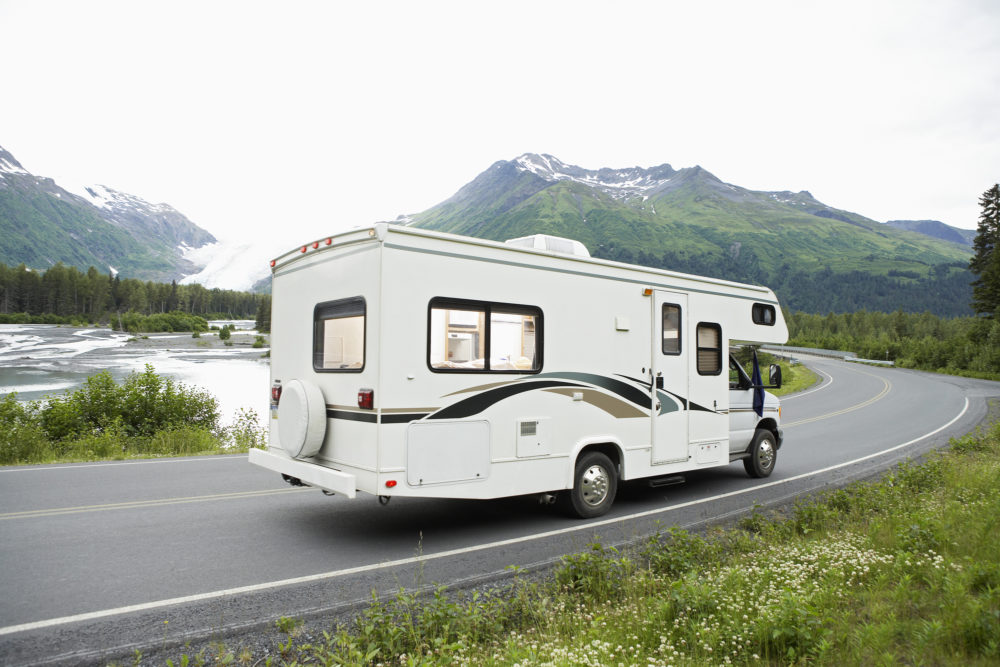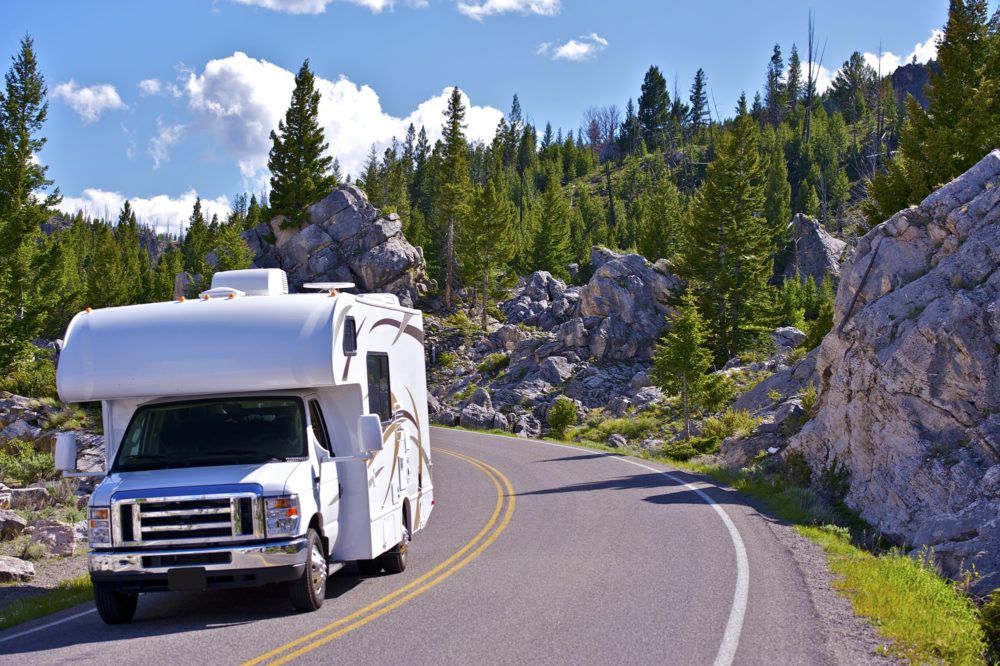Do RVs Have To Stop at Weigh Stations?
When camping in a Recreational Vehicle (RV), we always want to bring everything we can to make our camping trip comfortable.
However, more often than not, we forget that our Rvs have a legal weight limit, and we must be careful not to overload them. States must strategically weigh stations along highways to keep large commercial vehicles from overloading their axles and breaking the law.

Contents
- 1 What Are Weigh Stations For?
- 2 Understanding Your RV Weight
- 3 RV Weight Terminologies
- 4 What Does RV Weight Mean to Your Safety?
- 5 Can You Weigh for Free in Weigh Stations if You Want To Know Your RV Weight?
- 6 Weigh Station Rules for Different States
- 7 What Happens in Weigh Stations?
- 8 How To Avoid Weigh Stations
- 9 FAQs
What Are Weigh Stations For?
Weigh stations are roadside facilities where commercial motor vehicles (CMVs) are weighed, often without stopping. Weigh-in-motion (WIM) systems allow CMVs to be weighed while still moving.
The Federal Highway Administration (FHWA) has weight limits to protect our nation’s highways from being overwhelmed by too much weight, which can cause severe damage.
These limits also help ensure that vehicles are loaded safely and evenly, making every trip safer for everyone on the road.
Due to the nature of RVs, they fall into oversized vehicles, which are often much heavier than the average car.
By weighing RVs at weigh stations, authorities can ensure that these vehicles are not exceeding the weight limit for bridges and other roads.
Understanding Your RV Weight
Every RV manufacturer tests and certifies its vehicles to a specific weight limit before releasing the RVs to the consumers.
Exceeding these limits is bad for the vehicle and dangerous to the user and other road users.
RV Weight Terminologies
You will need to understand a few terms before we can proceed. They include;
Unloaded Vehicle Weight (UVW)
Also called “dry weight,” this is the weight of your RV plus any fluids necessary for its operation. This would include propane, fresh water, and oil.
The UVW does not include cargo, passengers, or other items you might add to the RV.
Gross Vehicle Weight Rating (GVWR)
This is the total permissible of a vehicle as specified by the manufacturer.
This includes the net curb weight of the unit plus passengers, personal items, all fluids, freight, optional equipment, and accessories.
The GVWR is displayed on a certification label on the driver’s door or door pillar.
Gross Axle Weight Rating (GAWR)
This is the maximum weight that a single axle system can carry.
The GAWR is also displayed on a certification label on the driver’s door or door pillar.
Gross Combined Weight Rating (GCWR)
This is the maximum weight of a fully-loaded vehicle and trailer.
The GCWR is also displayed on a certification label on the driver’s door or door pillar.
Payload Capacity
Also known as Cargo Carrying Capacity (CCC), the maximum weight the RV can carry is.
This includes the weight of all fluids, passengers, personal belongings, and optional equipment.
The payload capacity is also displayed on a certification label on the driver’s door or door pillar.
What Does RV Weight Mean to Your Safety?
There are a few things that you need to keep in mind when it comes to weight and your RV.
First, overloaded vehicles are more likely to experience mechanical problems.
The extra weight stresses the engine, transmission, brakes, and other systems.
It is essential to ensure your RV is not overloaded, as this can lead to expensive repairs down the road.
Additionally, overweight vehicles are more likely to be involved in accidents.
This is because they are more challenging to stop and more likely to experience brake failure.
Finally, overweight RVs can damage roads and bridges.
This is because they are much heavier than the average car and can cause considerable damage to pavements and structures.
For these reasons, it is vital to ensure that your RV is properly weighed at weigh stations.
This will ensure that your RV complies with the law and will also help keep you and other road users safe.
Can You Weigh for Free in Weigh Stations if You Want To Know Your RV Weight?
Weighing your RV at a weigh station is typically free of charge, but in some states, you might be required to pay a small fee.
Another way to weigh your RV is to use a portable scale.
Truck stops, RV dealerships, and some hardware stores have portable scales.
These scales are typically less accurate than public weigh stations, but they can give you a good idea of your RV’s weight.

Weigh Station Rules for Different States
The weight limit for road RVs will vary depending on your driving state.
Some states have weight limits as low as 26,000 pounds, while others have no weight limit at all. Commercial RVs are typically required to stop at weigh stations, but personal RVs are not.
However, all RVs must stop at weigh stations in some states. There are two exceptions to this rule. One is when a noncommercial driver drives the RV. The second is when the RV is registered in a state without a weigh station.
In these cases, the RV is not required to stop at a weigh station.
Some states, however, require all commercial RVs to be weighed. These include:
- Texas
- Connecticut
- California
- Kansas
RVs weighing over 10,000 pounds are required by law in some states to be weighed. These states include:
- Washington
- Wisconsin
- Michigan
- Minnesota
- Ohio
- North Dakota
- Rhodes Island
- Nevada
- Iowa
- Louisiana
- Massachusetts
- Arkansas
- Georgia
Pennsylvania requires anyone towing an RV or attached to a fifth wheel to stop at a weigh station.
In Delaware, RVs exceeding 46 feet (including the towing vehicle) must stop at a weigh station.
Apart from the written laws, in some states, a police officer can ask you to stop at a weigh station regardless of your vehicle class.
The states include:
- Mississippi
- New Hampshire
- Texas
- West Virginia
- Alaska
- Iowa
- Illinois
- Kansas
- North Carolina
- Oklahoma, Utah
- Vermont
- Maine
What Happens in Weigh Stations?
When you drive your RV into a weigh station, the first thing that happens is that you are weighed. A large scale is usually used to measure RVs.
The weight of your RV is then recorded. Depending on your weight, you may be asked to pull over for your vehicle to be inspected.
If you are overweight, you may be asked to offload some of your belongings to be within the weight limit.
In other cases, being overweight might attract a fine, or you might be impounded.
If you want to be safe and be aware of your weight before getting on the road, then you can use a CAT scale.
These large truck scales are designed to weigh vehicles up to 80,000 pounds. They can be found at truck stops and some gas stations. Be sure to find one that is level and in good condition.
Next, drive your RV onto the scale. Center the vehicle so that it is evenly balanced on the scale. Do not stop on the ramp – this will throw off the weight reading. Once the RV is stopped, please put it in the park position and set the emergency brake.
Then, get out of the RV and look at the weight reading on the scale. This will tell you how much your RV weighs. Be sure to write down the number so you can reference it later.
Repeat this process for each axle on your RV. Most RVs have two axles, but some have three or more. So again, you will need to know the weight of each axle to determine if your RV is overweight.
What Happens if You Don’t Stop at a Weigh Station?
You may be subject to a fine if you drive your RV on the highway and do not stop at a weigh station when required.
In some states, if you are found to be overweight, your RV may be impounded until the necessary repairs are made.
How To Avoid Weigh Stations
One way not to go through weigh stations is to plan your route and take advantage of rerouting strategies. For example, if you know which roads have weigh stations, you can plan your route accordingly and detour around them.
This may add a few extra miles to your trip, but it will help you avoid being weighed at a station’s hassle (and expense).
Another way of not going through weigh stations is to ensure your vehicle is not overweight.
Start by getting rid of any non-essential items. For example, do you need that extra set of dishes or that larger television? If not, get rid of it!
Consolidate multiple items into one. For example, if you have both a coffee maker and a kettle, see if there’s one that can serve both functions.
Finally, invest in lighter-weight alternatives where possible. For example, opt for plastic storage containers instead of metal ones, and choose lightweight furniture over heavier pieces.
FAQs
Here are some of the frequently asked questions about weight and RVs.
How do you find a weigh station near you?
The best way to find a weigh station near you is to use an online search tool such as Google Maps. A list of nearby weigh stations will appear after entering “weigh station” into the search bar.
How much does it cost to weigh an RV?
The cost of weighing an RV will vary depending on the location and type of weigh station. Some stations charge a fee for use, while others are free.
How do truckers know when to stop at weigh stations?
Most truckers have a GPS that tells them when they are approaching a weigh station. If you do not have a GPS, you can look for signs that say “weigh station ahead” or “trucks must stop.”
Do truckers have to stop at every weigh station?
No, truckers are not required to stop at every weigh station. However, they are required to stop at stations that are open and in operation.
Are weigh stations open at night?
Yes, some weigh stations are open 24 hours a day, while others have specific hours of operation.
Do weigh stations check your license?
In most cases, no. Weigh stations are primarily concerned with the weight of your vehicle, not your driver’s license. However, some states may require you to show your license when entering a weigh station.
Do you need a CDL to drive an RV?
No, you do not need a commercial driver’s license (CDL) to drive an RV. However, you may need a special license if your RV is large or heavy.
Can you weigh your car in weigh stations?
Yes, you can usually weigh your car at a truck weigh station. However, check with the weighing station if it is permissible.
